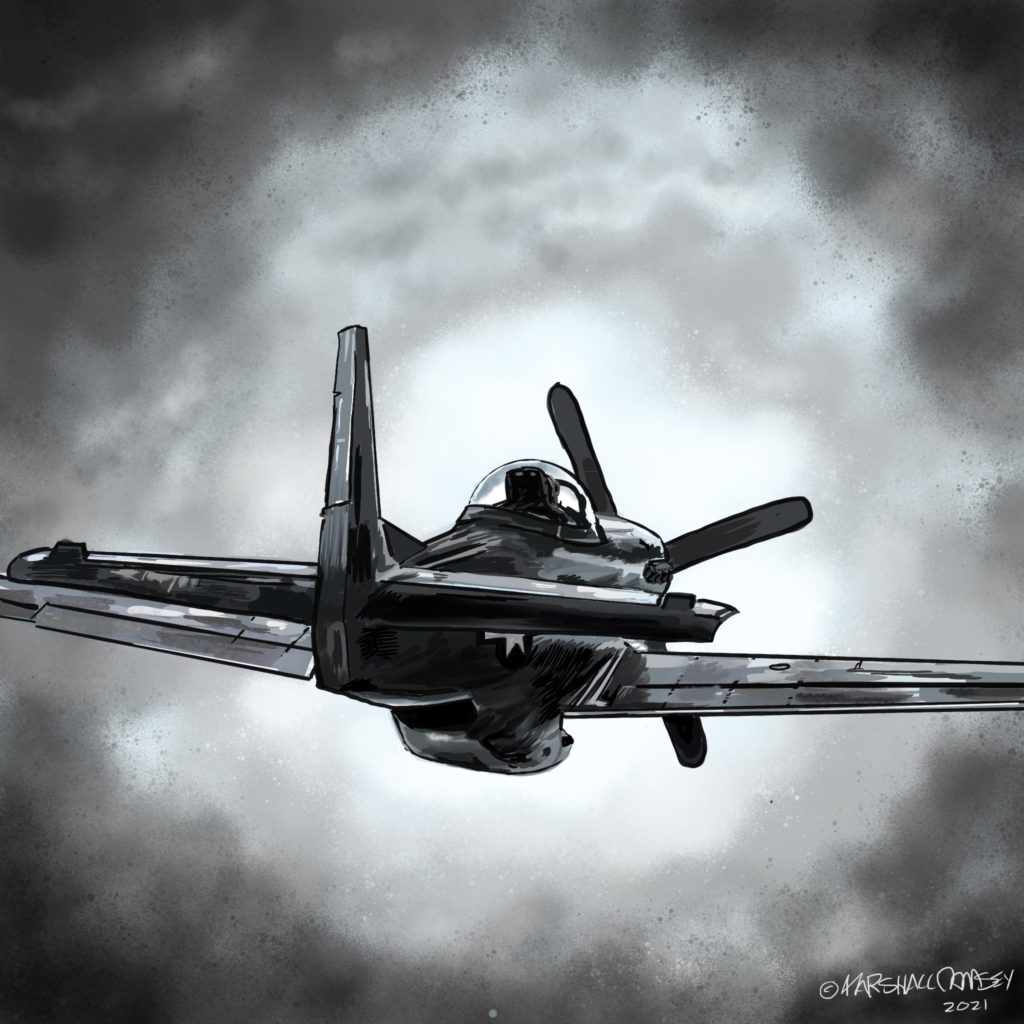
The dreams were happening more frequently and were more vivid.
There he was, back in World War 2, flying his fighter plane alone over Germany. Dark clouds boiled around his North American P-51D Mustang as flak and turbulence tossed him around the menacing sky. He cursed as he fought the planes controls. The plane responded with a reassuring scream from the Merlin engine’s supercharger. That screaming, which sounded beautiful outside of the plane, was more like a howling banshee inside. Hours of hearing it had cost him most of his hearing. But in these recent dreams, he could hear again. And his sense of smell was vivid, too. Oh how he could smell. The odor of sweat, oil, metal and fear lit his old memories like a fuse.
A flak shell went off to his right, bucking his Mustang and awaking him from his daydream. Daydreams could get you killed in war.
For nearly three years, he had fought over the skies of Africa and Europe, beating back totalitarianism and giving his gifts to his kids, grandkids and great-grandkids that they took for granted. Freedom wasn’t just a word. It wasn’t about having the right to whine on Facebook because someone hurt your feelings. It was the removal of the foot of fascism off the necks of the people. It was killing the scourge that murdered millions of innocent people in death camps. He saw so much whining today — but he knew sacrifice. He truly knew suffering.
The Great Depression had caused his parents to send him to his uncle’s house in California in 1932. While he understood later in life why they had to ship him away, the trauma it caused him drove him for the rest of his life. He had become very successful after the war. Starvation is a powerful motivator, after all. He remember where he was when Pearl Harbor was attacked. He remembering volunteering for the U.S. Army Air Corps.
From 1941 to 1945, he was truly a success. During those years, he was a knight in the sky who jousted with German fighter planes to protect U.S. bomber crews.
He felt his glove tighten on the stick. Flying came natural to him. He remembered watching Jimmy Doolittle in the newsreels as a kid and wanting to be just like him. Doolittle, who would later become a legend after leading the first bombing mission of Japan, made flying cool. They both shared the name Jimmy, too. Sitting in the cockpit of his trainer, he remembered the thrill of soloing for the first time. There was freedom in the air. Freedom from want. Freedom from feeling inadequate.
First he was assigned to fly the famous P-40. It was the plane the Flying Tigers had made famous in China dogfighting the Japanese. But one day, he saw the love of his life sitting at the end of his runway. Equipped with a bubble canopy and the powerful Merlin engine, the P-51D changed the war over Europe. Fast and maneuverable, it was also the first fighter able to escort B-17s Flying Fortresses and B-24 Liberator bombers all the way to Berlin and back. The bomber crews, who had been slaughtered by fighters and flak throughout the war, called the plane “the little friend.” The German Luftwaffe called it something much worse. He thought about the one time he escorted actor Jimmy Stewarts’ squadron over Germany.
A voice came over the radio.
“Cricket.”
While his name wasn’t “Jiminy,” his nickname in flight school became Jimmy Cricket, later shortened to Cricket.
“Tighten up formation, Cricket,” he heard the voice command. It was a voice he had not heard since 1944. It was his best friend Al — who had been shot down by a German fighter over France. The wreckage of Al’s plane had been found by advancing U.S. Army soldiers. He had not gotten out of the cockpit alive.
“Long time, no see, brother,” Cricket responded. The second Mustang wagged its wings in response.
“I’m here to take you home, brother,” Al’s voice warmly crackled over the radio.
“Home,” Cricket thought? Home had been a damn nursing home for the past 10 years since his beloved wife Dorothy died. Home had been a generic place with generic food. He had outlived three of his four his four kids and one of his grandkids. That was worse than losing Al. No one came to see him much anymore. The staff treated him like an oddity. The other residents were kids during the war. He just sat in the corner of the rec room in his wheelchair staring out at the sky. His beloved sky.
“Yes, home, Cricket,” Al repeated without being prompted. “And Dorothy is waiting for you back at the base.”
When Al said that, the flak stopped and the dark clouds began to part. The plane’s controls smoothed out and the Merlin engine began to sing. He checked his compass and couldn’t get a reading.
“Just stay on my wing,” Cricket, “I’ll get you home.”
Cricket pointed the nose of his Mustang into light.
And on a cold January morning, in the corner of a generic nursing home’s recreation room, one of the last members of the Greatest Generation faded into history.
